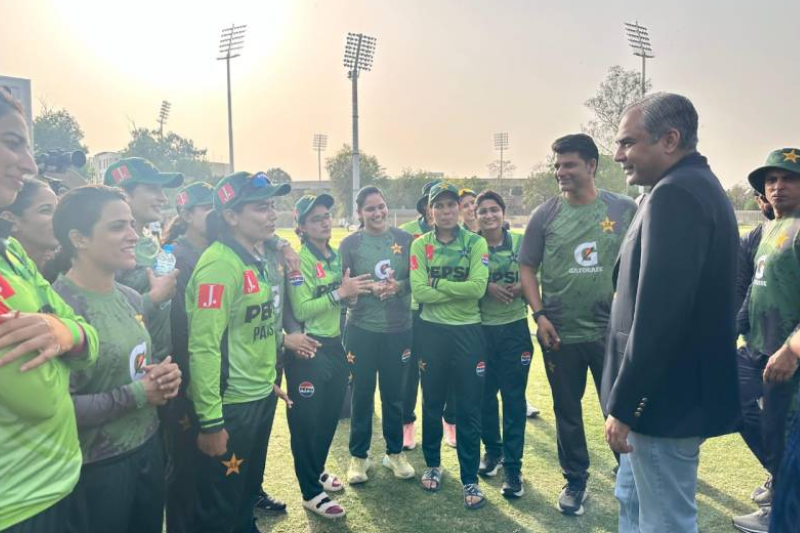Pakistan’s women’s cricket team faces a comprehensive shake-up following their disastrous Women’s World Cup 2025 campaign in Sri Lanka, with head coach Mohammad Wasim reportedly set to be replaced as the Pakistan Cricket Board plans sweeping changes across coaching staff, fitness standards, and development pathways.
Disappointing World Cup Performance
The Pakistan Cricket Board (PCB) is reportedly planning significant changes to the women’s cricket team’s coaching staff following the team’s disappointing performance in the ongoing Women’s World Cup 2025. Pakistan has struggled in Sri Lanka, remaining winless after five matches and sitting at the bottom of the points table with only two points.
Their only notable performance came in a rain-affected match against England, where they restricted the defending champions to 133-9 in 31 overs and started well in their reply before the match was abandoned due to rain. The team’s inability to convert promising positions into victories has become a recurring theme throughout the tournament.
Pakistan’s performance in the recent tournament has fallen far short of expectations. Despite showing promise during the qualifying stages where they finished unbeaten, Fatima Sana’s team has yet to win a single match and is virtually out of semi-final contention with limited games remaining.
Mohammad Wasim Set for Replacement
Sources suggest that head coach Mohammad Wasim may be replaced after the tournament, with discussions already underway to identify potential successors. This potential change comes just over a year after Wasim’s appointment in June 2024, ahead of the T20 Asia Cup.
Wasim was brought in with specific plans to overhaul the team, including more effective workload management practices, greater use of performance data, and a shift in mindset towards positive cricket. Despite initial optimism and some encouraging results, the World Cup campaign has exposed persistent weaknesses that predated his tenure.
Broader Coaching Staff Changes Expected
Other members of the coaching staff, including assistant coach and former Pakistan fast bowler Junaid Khan, may also be reassigned or let go as part of the comprehensive shake-up. The PCB is reportedly keen on bringing in foreign strength and conditioning coaches to elevate players’ fitness standards and overall professionalism.
The planned introduction of international expertise reflects recognition that Pakistan women’s cricket requires external perspectives and methodologies to reach competitive international standards. Fitness and conditioning have been identified as critical areas where Pakistan lags significantly behind other top nations.
Focus on Fitness and Professional Standards
In addition to coaching changes, the PCB plans to bring in foreign strength and conditioning coaches aimed at improving the players’ physical fitness and technical skills to better compete at the international level. This represents acknowledgment that current fitness standards fall short of requirements for sustained success in modern women’s cricket.
According to sources within the Pakistan Cricket Board, significant gaps in preparation, fitness, and execution of the national team have prompted the board to consider a comprehensive shake-up of the women’s cricket structure. The World Cup campaign has exposed these deficiencies starkly through repeated collapses and inability to maintain performance standards across full match durations.
Development Pathway Reforms Planned
Beyond changes at the senior level, the board is also planning reforms to strengthen the women’s development pathway. These include increasing foreign tours for the Under-19 women’s team, aimed at providing young players with greater exposure and experience in varied conditions before transitioning to the national side.
The PCB believes that consistent overseas experience for the U-19 squad will be crucial in bridging the gap between junior and international cricket—an area long identified as a weakness and once again exposed during the Women’s ODI World Cup. Current transition systems have failed to adequately prepare young players for the intensity and technical demands of international competition.
Systemic Issues Beyond Coaching
While coaching changes grab headlines, Pakistan women’s cricket faces deeper systemic challenges that extend beyond individual appointments. Limited domestic infrastructure, irregular international exposure, and inadequate professional support systems create cumulative disadvantages that coaching alone cannot overcome.
The absence of a women’s Pakistan Super League remains a significant gap. While the PCB has notionally committed to launching a women’s PSL, progress remains slow. Other nations’ domestic T20 leagues provide crucial professional experience and financial sustainability that Pakistani players currently lack.
Historical Context of Recent Struggles
Pakistan’s recent international record tells a troubling story. They won just one of eight T20Is during tours of the West Indies and England, and went winless in both ODI series during those tours. These results followed a year where extended dry runs were interspersed with occasional encouraging results, most notably a home T20I series whitewash of South Africa.
The team had shown promise by becoming the first Asian women’s side to win a T20I series in New Zealand, demonstrating capability that makes recent failures more frustrating. The inconsistency suggests mental and strategic issues beyond pure technical deficiencies.
Player Performance Concerns
Beyond coaching, individual player performances have disappointed throughout the World Cup. Senior players who should provide stability and leadership have struggled for runs and wickets, while younger players lack the experience to compensate during crises.
The batting lineup in particular has proven fragile, with regular collapses undermining otherwise competitive positions. Pakistan’s inability to build partnerships or accelerate during crucial phases reflects both technical limitations and mental pressure that accumulates through repeated failures.
Timeline for Implementation
The upcoming overhaul of the women’s cricket management is viewed as the first step in a long-term strategy to rebuild confidence and competitiveness in the national side ahead of upcoming international assignments. The PCB recognizes that meaningful improvement requires sustained commitment rather than reactive changes.
However, the timing creates challenges. With limited cricket scheduled immediately after the World Cup, new coaches will have restricted opportunities to implement systems before the next major assignment. Building chemistry and installing new methodologies requires time that compressed international calendars rarely provide.
Comparative Regional Context
Pakistan’s struggles occur while neighboring India continues dominating women’s cricket in Asia, reaching World Cup semi-finals and consistently competing against global powerhouses. This widening gap creates additional pressure on Pakistani administrators to accelerate improvements.
Bangladesh and Sri Lanka have also shown progress, making Pakistan’s stagnation more conspicuous within South Asian women’s cricket. Regional rivalries intensify scrutiny on Pakistan’s development model and resource allocation for the women’s game.
Financial and Infrastructure Investment Required
Meaningful transformation requires financial commitment beyond coaching appointments. Modern women’s cricket demands professional environments including dedicated training facilities, sports science support, consistent international tours, and competitive domestic competitions.
The PCB’s willingness to invest foreign currency in international coaching expertise suggests recognition of these requirements. However, sustained investment across all areas determines whether Pakistan can close gaps with leading nations or merely cycle through coaches without addressing underlying deficiencies.
Also read this: Asif Afridi Makes Historic Test Debut at 38
Looking Ahead: Rebuilding Process
As Pakistan prepares for the post-World Cup transition, stakeholders recognize that rebuilding requires patience alongside urgency. Quick fixes through coaching changes must be complemented by structural reforms that create sustainable competitive advantages.
The next generation of Pakistani women cricketers deserves systems that maximize their potential through professional support, regular competition, and clear development pathways. Whether the upcoming overhaul delivers these foundations will determine Pakistan women’s cricket trajectory for years to come.
Keep conntected with us Facebook,Youtube and Twitter for latest Sports news happening around the globe.


1 thought on “PCB Plans Changes After Pakistan Women’s World Cup Failure”